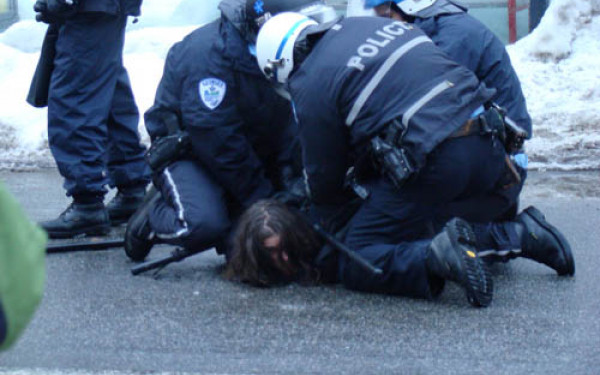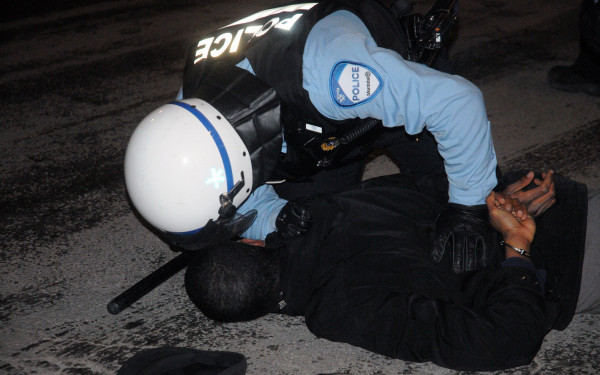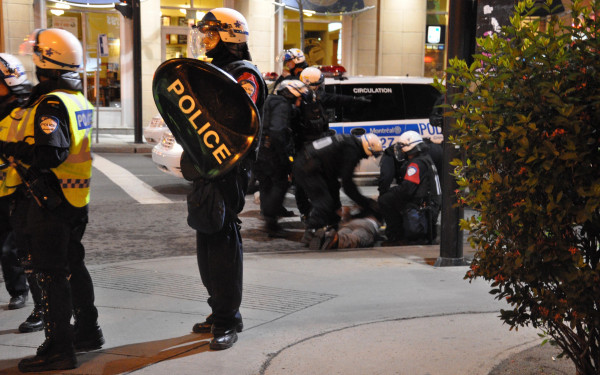Police Violates Student Journalist’s Rights
His Perspective on What Went Down and Why the Police are Wrong
So it finally happened. After covering dozens of Montreal protests with—relatively—little incident for The Link and 99% Media, I was detained on the evening of July 24 by a police officer and given a ticket under Article 500.1 of Quebec’s Highway Safety Code, for a sum of $504.
This happened at a small downtown demonstration in solidarity with the Unist’ot’en Camp in British Columbia, with a total of approximately 70 participants. I was there live-streaming the event, as I often do.
I will be contesting this ticket in court for the following three reasons:
1. I am not guilty of the offence described under article 500.1.
2. My press freedom was flagrantly encroached on by a member of the SPVM.
3. They got my name wrong.
WHAT HAPPENED?
As my viewers can attest to, I have a general policy of adhering to police orders when I’m live streaming protests. If an officer tells me to move from a specific spot—say, like moving to the other side of a street—I’ll generally comply. The reason for this is simple: if you give the officer a hard time and stand (literally) on principle, you’re increasing the risk of being detained sooner rather than later. In the pursuit of news-gathering, this helps no one; you’re taken out of play, and your ability to report on events is severely—if not completely—compromised.
On the evening of the 24th, however, there was no direct warning or order. Around 6 p.m., police moved in on marching protesters and began detaining a handful of them on the intersection of Stanley St. and de Maisonneuve Blvd. As I was filming the incident, an officer grabbed my wrist, moved me to the front of his police van and told me I was getting the ticket. I offered no resistance, yet he still felt it necessary to keep a grip on my wrist—despite the fact that I was not under arrest and was cooperating fully.
The officer claimed that I had failed to follow police orders given over a loudspeaker to the people marching: please protest on the sidewalk.
In response, I pointed out the obvious: I was not present for these events as a protester and was not marching for the cause. I was there to capture images for journalistic purposes, and my press credentials were fully visible. The officer was having none of it, and said that police had had their “eyes on me” since the start of the march. Without explaining this peculiar statement further, he asked me twice to turn off and put away my phone, which I use to livestream. I politely said that I would not be doing this.
The officer became slightly agitated, and I could feel his grip on my wrist tighten slightly. He then grabbed my phone and placed it in my pocket—thus ending my livestream. As I stared at him with a mixture of bewilderment and frustration, he asked for a piece of I.D. and told me to stay put while he wrote up my ticket.
Let’s get back to why I’ll be contesting this ticket:
First, I am not guilty of the offences described in the document. I say “offences”, plural, because the French and English sections actually describe two different infractions. In French, roughly translated, I am accused of “occupying a public road in the course of a concerted action meant to block the circulation of vehicles.” In English, I am guilty of “having occupied a road used as an alternate route for traffic diverted from a public highway [huh?] by placing an obstacle [emphasis is mine] so as to obstruct vehicular traffic on the road, without autorization [sic].”
The offences described are clearly different, and I am guilty of neither. I did not occupy a public road as part of a concerted action that meant to block traffic. That’s just not what journalists do. Furthermore, I did not place any obstacle meant to obstruct vehicular traffic on the road. On this point, I asked another officer if my person would constitute an obstacle, to which he answered:
“Yeah, that’s you. You’re the obstacle.”
It’s also worth noting that the flow of traffic was obstructed by police vehicles stationed on various intersections of de Maisonneuve Blvd., not by protesters—and certainly not by the handful of journalists present. At no point did my physical presence ever impede the movement of a motor vehicle.
But putting aside the language of this ticket, we have a larger issue to contend with here. In detaining me, plucking the phone from my hand and ending my live stream, the officer directly encroached on my press freedom, as guaranteed by the Canadian Charter of Rights and Freedoms article 2 (b), and the right to expression guaranteed by the Quebec Charter of Human Rights and Freedoms (provision 3). On what grounds was this action taken? I wasn’t under arrest, and me holding a phone up at about chest level posed a threat to absolutely no one.
Except…well. You know.
Oh, and he spelled my name wrong on the ticket. The officer had my government-issued I.D. in hand, and still managed to make the ticket out to “Mathieu d amour.”
I’m Mathieu D’Amours. I don’t know who that other guy is.
WHAT HAPPENS NEXT?
Montreal police chief Marc Parent will be stepping down from his post soon, and Mayor Denis Coderre has chosen Philippe Pichet as his replacement. Pending approval by city council, Pichet will start his new job in September, which may mean a change in police tactics during protests.
This coincides with an impending flurry of student, union and general strike activity this fall. Spring 2015 had some moments of intensity in Montreal, but it never materialized into something on the scale of the Maple Spring in 2012. Activists seem to have taken this to heart, and many organizations have been working on a game plan over the summer. For those of us with our ear to the ground, there have been ever-growing rumblings of some serious protest activity coming up.
These two factors—a new police chief and upcoming social unrest—raise several questions about how this fall will shape up for journalists. Large and intense protests are newsworthy events, but for student and independent journalists, they can be fraught with danger. Too many times, I’ve seen these reporters denied access, assaulted and mocked. The SPVM treats them like shit, while their mainstream counterparts are mostly left alone—although they sometimes get their share of abuse as well. The SPVM has previously stated that it does not discriminate between different types of media, but it’s been almost impossible to see this policy at work on the streets of Montreal.
So one must wonder: will the new police chief try to turn a new page on the way police and media interact? Or will he reinforce the current system, where non-mainstream journalists are routinely kettled along with protesters? It’s important to note that Pichet has previously worked with SPVM units dealing with protests and counter-terrorism—résumé entries that reek of “the old ways” of police tactics.
However, a journalist should always keep an open mind, and I’m looking forward to seeing how this all plays out. One thing is certain: student and independent journalists will be out in droves this fall—I certainly will be. We’re not going to stay home under the spectre of being targeted by the police. I sincerely hope the SPVM realizes that the best way forward would be to respect everyone’s press freedom, so we can all stop sending our contested tickets back to city hall, with increasingly frustrated written reminders of our Charter rights.

_900_672_90.jpg)
_600_832_s.png)




01web_600_375_90_s_c1.jpg)